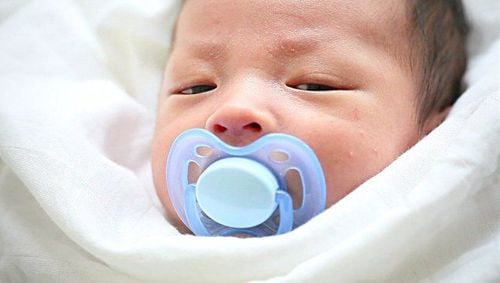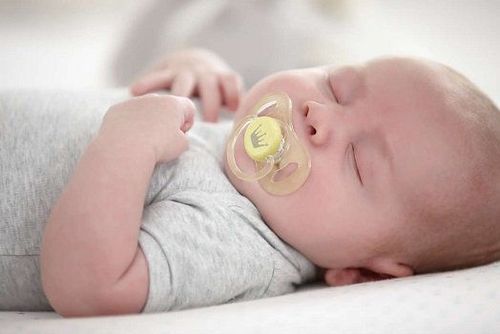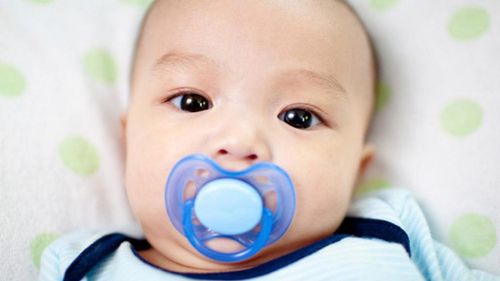This is an automatically translated article.
The article was professionally consulted with Specialist Doctor II Le Thanh Cam - Pediatrician - Pediatrics - Neonatology - Vinmec Danang International General Hospital.Babies often suck to soothe themselves, which is why many babies depend on pacifiers or fingers when they're not breastfed or bottle-fed. However, many parents worry that giving their baby a pacifier can affect their teeth as well as the breastfeeding process.
1. Benefits of nipples
Here are some of the benefits a pacifier can provide for both mother and baby, including:Reduces risk of SIDS: giving your baby a pacifier during naps or at night can prevent significantly reduces the risk of sudden infant death syndrome (SIDS). While it's not known for sure how they work, giving your baby a pacifier during sleep cuts the risk of SIDS by more than half. Response to suckling reflex: Newborns often have a natural need to suckle. While bottles and breast milk can meet this need, however, the baby's desire can linger even when they are full. In this situation, you can give your baby a pacifier outside of mealtimes. Help your baby self-soothe: A pacifier can help babies learn to control their emotions, relax, and feel more secure. This comfort has a double benefit: when the child is calmer, it also helps the parent feel more relaxed.
Trắc nghiệm: Nhận biết sớm dấu hiệu chậm phát triển thể chất và trí tuệ ở trẻ
Nếu 6 tuổi không biết đếm số, 7 tuổi vẫn chưa phân biệt được giữa thực tế và tưởng tượng thì có thể bé chậm phát triển thể chất và trí tuệ hơn so với bạn bè cùng lứa. Bạn đã nhận biết được các dấu hiệu bất thường sớm này chưa? Cùng làm nhanh bài trắc nghiệm sau để trang bị thêm kiến thức cho mình nhé!
The following content is prepared under supervision of Thạc sĩ, Bác sĩ y khoa, Ma Văn Thấm , Nhi , Phòng khám Đa khoa Quốc tế Vinmec Dương Đông(Phú Quốc)
2. Risks of using pacifiers for babies
Besides the outstanding advantages that pacifiers bring, they also have certain limitations, including:Affects breastfeeding: breastfeeding is a natural process. However, it will take some time for your child to get used to this. For babies, it's best not to introduce a pacifier too early, instead let your baby learn how to breastfeed properly before, at least after a month of age. Ear problems: According to some recent studies, giving babies a pacifier can be twice as likely to get ear infections compared to other babies. Dental problems: some parents worry about how pacifier use can affect their baby's baby teeth. Ideally, you should not give your child a pacifier long-term (before age 2), moreover any dental problems should fix on their own within 6 months. From the age of 2 onwards, if you continue to give your baby a pacifier, it will make dental problems worse. A child's upper and lower front teeth may be crooked.

3. Some tips when letting your baby use a pacifier
If you want to let your baby use a pacifier, you can apply some of the following methods to ensure safety and prevent some health-related risks for your baby, including:Absolutely do not use Use brands that contain bisphenol-A (BPA), a compound widely used in the production of plastics. This compound can damage the enamel of young children's teeth, even increasing the risk of developing certain diseases later in life such as diabetes, prostate cancer, breast cancer, obesity, reproductive disorders, etc. ... Do not tie the pacifier around the baby's neck as it can cause choking due to the lanyard. Choose the right size pacifier, suitable for the child's age and mouth. Do not allow children to share pacifiers. because it can cause bacterial infection through the mouth. In addition, you should clean the nipple with soap and hot water before giving it to your baby. Choose nipples that have a screen larger than the mouth and have ventilation holes to let air in. Do not put anything on the pacifier when giving it to your baby, such as sugar, which can damage your baby's teeth. If your baby is using a pacifier and has had an ear infection, it's best to stop using it to prevent other potentially serious complications.
Please dial HOTLINE for more information or register for an appointment HERE. Download MyVinmec app to make appointments faster and to manage your bookings easily.
Article reference source: webmd.com














